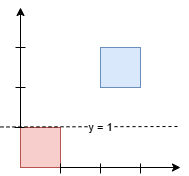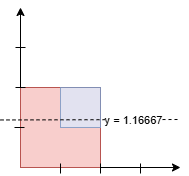Separate Squares I
MediumUpdated: Aug 2, 2025
Practice on:
Problem
You are given a 2D integer array squares. Each squares[i] = [xi, yi, li]
represents the coordinates of the bottom-left point and the side length of a square parallel to the x-axis.
Find the minimum y-coordinate value of a horizontal line such that the total area of the squares above the line equals the total area of the squares below the line.
Answers within 10-5 of the actual answer will be accepted.
Note : Squares may overlap. Overlapping areas should be counted multiple times.
Examples
Example 1
Input: squares = [[0,0,1],[2,2,1]]
Output: 1.00000
Explanation:

Any horizontal line between `y = 1` and `y = 2` will have 1 square unit above
it and 1 square unit below it. The lowest option is 1.
Example 2
Input: squares = [[0,0,2],[1,1,1]]
Output: 1.16667
Explanation:

The areas are:
* Below the line: `7/6 * 2 (Red) + 1/6 (Blue) = 15/6 = 2.5`.
* Above the line: `5/6 * 2 (Red) + 5/6 (Blue) = 15/6 = 2.5`.
Since the areas above and below the line are equal, the output is `7/6 =
1.16667`.
Constraints
1 <= squares.length <= 5 * 10^4squares[i] = [xi, yi, li]squares[i].length == 30 <= xi, yi <= 10^91 <= li <= 10^9- The total area of all the squares will not exceed
1012.
Solution
Method 1 – Binary Search + Direct Area Calculation
Intuition
Since overlapping areas are counted multiple times, the area below a line y is simply the sum of the area of each square below y. We can use binary search to find the minimum y where the area below is half the total area.
Approach
- For a given y, for each square, compute the area below y (if any part of the square is below y).
- Sum all such areas for all squares.
- Use binary search on y to find the value where the area below y is half the total area.
- Return the minimum such y.
Code
C++
class Solution {
public:
double separateSquares(vector<vector<int>>& squares) {
auto area = [&](double y) -> double {
double res = 0;
for (auto& sq : squares) {
double yl = sq[1], yr = sq[1] + sq[2];
if (y <= yl) continue;
double h = min(y, yr) - yl;
if (h > 0) res += h * sq[2];
}
return res;
};
double total = 0;
for (auto& sq : squares) total += sq[2] * sq[2];
double l = 0, r = 1e9 + 1;
for (int it = 0; it < 50; ++it) {
double m = (l + r) / 2;
if (area(m) * 2 < total) l = m;
else r = m;
}
return l;
}
};
Java
class Solution {
public double separateSquares(int[][] squares) {
double total = 0;
for (int[] sq : squares) total += (double)sq[2] * sq[2];
double l = 0, r = 1e9 + 1;
for (int it = 0; it < 50; ++it) {
double m = (l + r) / 2;
double area = 0;
for (int[] sq : squares) {
double yl = sq[1], yr = sq[1] + sq[2];
if (m <= yl) continue;
double h = Math.min(m, yr) - yl;
if (h > 0) area += h * sq[2];
}
if (area * 2 < total) l = m;
else r = m;
}
return l;
}
}
Python
class Solution:
def separateSquares(self, squares: list[list[int]]) -> float:
def area(y):
res = 0
for x, yl, l in squares:
yr = yl + l
if y <= yl:
continue
h = min(y, yr) - yl
if h > 0:
res += h * l
return res
total = sum(l * l for x, y, l in squares)
l, r = 0, 1e9 + 1
for _ in range(50):
m = (l + r) / 2
if area(m) * 2 < total:
l = m
else:
r = m
return l
Complexity
- ⏰ Time complexity:
O(n log M), where n = number of squares, M = search range. Each area computation is O(n), binary search is log M steps. - 🧺 Space complexity:
O(1), as only a few variables are used.